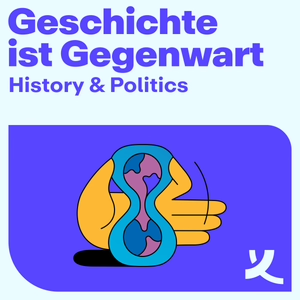
British urban planning of Jerusalem with Noah Hysler Rubin
02/09/22 • 71 min
2 Listeners
McLean, Ashbee and Geddes may not be household names for many in Jerusalem and those who are in various way interested in, or attached to the city. Yet, these British urban planners had a major influence in the development of Jerusalem and its design since the British conquered the city in December 1917. Dr. Noah Hysler Rubin, an urban planner and geographer at Bezalel Academy of Arts and Design in Jerusalem, tells about the role these individuals played in re-imagining and planning the city once the British took over. Their legacy is particularly visible in the city outside the walls where they had been able to accommodate various ideas, their own, the desire of the British administrators and finally of the Zionists - local Arabs were essentially excluded from the process. With Dr Rubin, we then discussed the question of the Jerusalem Municipal Archives, a rather neglected, underfunded and hard to access institution that could provide invaluable material in order to write a more comprehensive history of modern Jerusalem. In the end Dr Rubin hopes that her work will help many to understand the various layers of Jerusalem and began to be more inclusive and remember those who have been excluded in the past.
Support this show http://supporter.acast.com/jerusalemunplugged.
Hosted on Acast. See acast.com/privacy for more information.
McLean, Ashbee and Geddes may not be household names for many in Jerusalem and those who are in various way interested in, or attached to the city. Yet, these British urban planners had a major influence in the development of Jerusalem and its design since the British conquered the city in December 1917. Dr. Noah Hysler Rubin, an urban planner and geographer at Bezalel Academy of Arts and Design in Jerusalem, tells about the role these individuals played in re-imagining and planning the city once the British took over. Their legacy is particularly visible in the city outside the walls where they had been able to accommodate various ideas, their own, the desire of the British administrators and finally of the Zionists - local Arabs were essentially excluded from the process. With Dr Rubin, we then discussed the question of the Jerusalem Municipal Archives, a rather neglected, underfunded and hard to access institution that could provide invaluable material in order to write a more comprehensive history of modern Jerusalem. In the end Dr Rubin hopes that her work will help many to understand the various layers of Jerusalem and began to be more inclusive and remember those who have been excluded in the past.
Support this show http://supporter.acast.com/jerusalemunplugged.
Hosted on Acast. See acast.com/privacy for more information.
Previous Episode

The Palestine Exploration Fund with Felicity Cobbing
The Palestine Exploration Fund is a familiar name to many who work or visited Jerusalem. While the general sense is that it was a branch of British colonialism in the region, its origin and institutional life are not necessarily located within the machinations of the British government. The PEF was born in the late 19th century with the idea to promote the scientific discovery of biblical locations and archaeological sites through the mapping and surveying of Palestine and Jerusalem. Felicity Cobbing, Chief Executive and Curator of the PEF, takes us through the history and archives of the PEF discussing its origins, functioning and legacy. With the Felicity we have unpacked several issues, including the role of women and of the colonial connections between the PEF and the British government. The first Ordnance Survey of 1865 which fostered the establishment of the PEF and later the production of a general survey of Palestine, it can be safely said that it change the way the city of Jerusalem was understood and portrayed.
https://www.pef.org.uk/
Support this show http://supporter.acast.com/jerusalemunplugged.
Hosted on Acast. See acast.com/privacy for more information.
Next Episode

The deal of the century? Cemal Pasha's attempt to sell the Western Wall in 1916
In this special episode of Jerusalem Unplugged with no guest, I will tell you the story of a neglected and forgotten event that took place during the First World War in Jerusalem and might have changed the course of the city's history. In 1916 the Ottoman Military Governor and Commander of Syria and Palestine, Cemal Pasha, offered to Albert Antebi, a local Jewish representative (well respected and openly anti-Zionist) the possibility to purchase the area in front of the Western Wall and to demolish the houses owned by the local Moroccans. In this podcast I will recount the story of the offer and the subsequent debates amongst the member of the Zionist organization. While the money to complete the purchase was collected, many in the Zionist camp were not so eager to move forward and eventually the combination of this factor with a change of mind by Cemal Pasha, the affair did not materialize. Zionist leaders swore to keep the story secret and the story did indeed remain buried in the archives for a long time. While the documents were available, no historian of Zionism ever reported this. It is hard to speculate 'what if' the Western Wall had been sold during the war, what would have happened may not have an easy answer, but if anything else this event tells us that there is a lot more we don't know.
Support this show http://supporter.acast.com/jerusalemunplugged.
Hosted on Acast. See acast.com/privacy for more information.
If you like this episode you’ll love
Episode Comments
Generate a badge
Get a badge for your website that links back to this episode
<a href="https://goodpods.com/podcasts/jerusalem-unplugged-196944/british-urban-planning-of-jerusalem-with-noah-hysler-rubin-19403126"> <img src="https://storage.googleapis.com/goodpods-images-bucket/badges/generic-badge-1.svg" alt="listen to british urban planning of jerusalem with noah hysler rubin on goodpods" style="width: 225px" /> </a>
Copy




